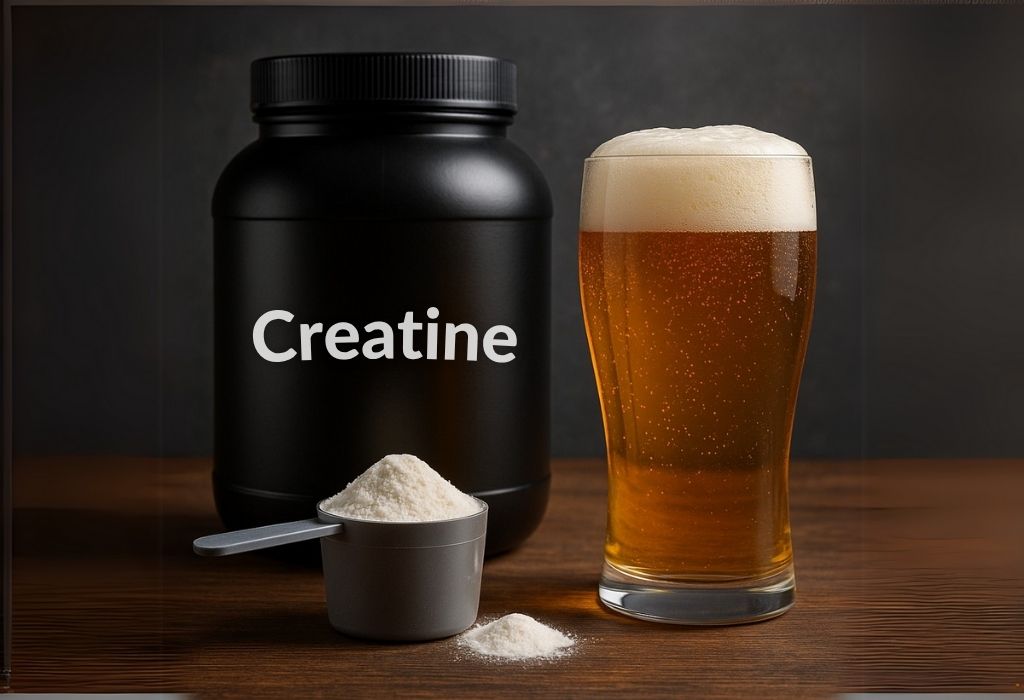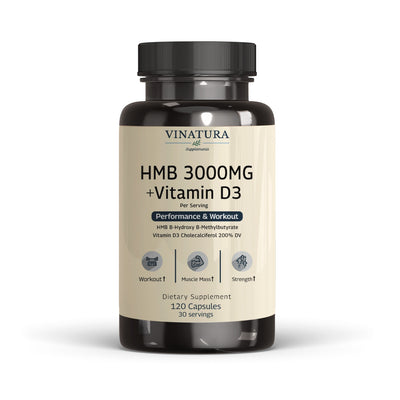
Effects Of Creatine With Alcohol On Your Body: Good Or Bad?
Many people who use creatine to build muscle or improve their fitness have a lot of questions because if used incorrectly, it will definitely not be effective and can even be harmful. One question that many people are concerned about is whether it is safe to drink alcohol while using this supplement. Read on to discover what experts and real users have to say—and find out what is best for your health and performance.
Before exploring further, please read the disclaimer located at the end of this webpage.
What Is Creatine? How Does It Work?

Creatine is a naturally occurring compound synthesized in the human body from three amino acids: arginine, glycine, and methionine. It primarily exists in the form of creatine phosphate and is stored in the muscles, brain, liver, kidneys, and pancreas.
While creatine used in dietary supplements is often produced synthetically, it is not an artificial substance. Creatine naturally plays a critical role in energy metabolism, especially in muscle cells.
Under normal conditions, the body obtains about 1 to 2 grams of creatine per day from dietary sources like seafood and red meat [2].
However, this amount may be insufficient for individuals with higher creatine needs, such as athletes, older adults, or people with certain metabolic limitations. In these cases, dietary supplements in the form of powder, capsules, tablets, or liquids can help meet the increased demand [1, 2].
So, why is creatine so popular among athletes and fitness enthusiasts? To understand this, let’s look at how creatine works in the body.
When consumed, creatine is absorbed and transported into skeletal muscle, where it is converted into phosphocreatine. This is a stored form of energy that helps regenerate adenosine triphosphate (ATP), the body’s main source of cellular energy. As a result, taking creatine before workouts may help boost energy levels and improve exercise performance [2].
Additionally, creatine may support faster muscle recovery and energy replenishment during physical activity. Some studies also suggest associations between creatine and hormonal activity, though more research is needed to confirm these effects.
What Is Alcohol?

Alcohol is a beverage containing ethanol, a substance that can directly affect the brain and may be habit-forming when consumed in excess. While moderate alcohol consumption is considered acceptable in many cultures, long-term or excessive use has been linked to a range of health issues.
For instance, it is estimated that in 2019 alone, more than 470,000 people died from heart disease associated with alcohol consumption [3]. These findings highlight the potential health risks of alcohol, especially when used irresponsibly.
As a result, many people question whether alcohol could interfere with the effects of creatine in a similar way to how it impacts other organs. This question will be explored further below.
How Do Alcohol and Creatine Affect Your Body?

Muscle movement
Ethanol from alcohol can cause dehydration in the muscles, leading to cramps. In addition, after drinking alcohol, many people feel the need to urinate frequently. If not rehydrated in time, the body may face dehydration problems with symptoms such as dizziness, lightheadedness, dry lips, etc.
It can be seen that creatine and alcohol are two substances that confront each other in this aspect. While one side tries to retain water in the muscles, the other side continuously excretes water.
Ability To Absorb Nutrients
Alcohol not only causes dehydration but also damages the digestive system by causing this organ to lose its ability to secrete enzymes to digest food. This is the reason why you feel nauseous after drinking alcohol.
Along with that, alcohol directly affects the absorption of many different nutrients, including glucose, amino acids, lipids, vitamins, and minerals in the small intestine. As a result, the body may experience nutritional deficiencies, which can compromise its overall well-being and reduce its ability to respond effectively to external stressors.
On the contrary, creatine blends with the body, and excess is naturally excreted through urine. Therefore, the body does not feel too stressed if you supplement creatine properly.
At the same time, when using creatine with protein or after consuming foods containing protein, the body may benefit more as both protein and creatine work synergistically to support muscle development and physical performance.
You may also read: Does Creatine Show Up On Drug Tests?
Effectiveness Of Supplements
Alcohol can hinder the body's absorption of certain nutrients, such as thiamine (vitamin B1), vitamin B12, folic acid, and zinc. This is the reason why people who drink alcohol are always tired, lack strength, have poor appetites, etc.
On the contrary, creatine may help support energy production and physiological function when combined with regular exercise and proper nutrition.
And of course, after these organs function well, this may help support physical performance and general wellness when combined with a healthy lifestyle. If you use any additional functional foods according to your doctor's instructions, they will be well absorbed.
Creatine And Alcohol: Can We Use Together?
Realizing the dangers of alcohol, of course everyone knows that we should not use alcohol for a long time, except in cases where a traditional Chinese medicine doctor prescribes it for some problems that require the use of medicinal alcohol (such as when disinfecting wounds).
However, for some alcoholics, stopping drinking immediately is quite difficult. Therefore, what they are concerned about is whether using creatine will have any effect while gradually reducing the amount of alcohol consumed each day. Or in other words, is it okay to use creatine with alcohol at the same time?
This has created a heated debate among many users in the past 7 months. Specifically, some people agree that alcohol affects the results of using creatine but simply slows down the effectiveness.
For example, instead of increasing muscle and endurance after 3 months with normal people, if you use alcohol, it takes you longer, which does not mean it does not happen.*
But others have a more negative view, saying that using them together is a mistake. Most people who drink alcohol have liver problems and when they add creatine, but the liver cannot process it as well as normal people, this makes the liver problem worse.
This combination may place additional strain on the liver and should be avoided, especially for individuals with pre-existing liver conditions.
Below is a statistical image of the results of agreement on whether or not to use creatine according to many topics discussing creatine and alcohol on Quora, Reddit, ...:*

Based on this result and personal understanding, we can also give the answer that not only creatine but any functional food or food should not be used when drinking alcohol.
Reducing or avoiding alcohol is strongly recommended, especially when using supplements like creatine. Excessive alcohol consumption has been linked to serious health risks, including liver and kidney complications.
Unforeseen Consequences Of Using Creatine With Alcohol
Surely many people still firmly believe that using creatine with alcohol together is not too dangerous, it simply reduces the effectiveness. Below are the obvious harmful effects that you must be aware of as soon as possible about using alcohol in parallel with creatine:
Effects On Liver & Kidney
Drinking alcohol and creatine causes the liver and kidneys to work excessively to excrete excess, toxic substances from the body. If you do not promptly change your lifestyle and use these two types, you will certainly face the risk of diseases related to these two organs.
Dehydration
The effects of alcohol are similar to a diuretic, but this is when you use it excessively. Therefore, you always feel the need to urinate and urinate continuously. If you do not hydrate in time, you cannot avoid the risk of dehydration.
Moreover, dehydration itself—regardless of whether creatine is used or not—has the unintended consequences of impairing muscle function, reducing exercise performance, and suppressing immune function.
So if you supplement with creatine but don’t drink enough water, these general risks of dehydration can be even more pronounced [7].
Learn more: Can You Mix Creatine with Gatorade?
Restless
Many people feel a little lightheaded and relaxed after drinking alcohol. In fact, alcohol is seeping into every cell and making you more stressed and exhausted the next day. And combining these two substances also increases the pressure on the muscles; while one side retains water, the other excretes it, making the body extremely stressed.
Muscle Breakdown
Alcohol can hinder muscle recovery by negatively interfering with sleep and recovery hormones (such as difficulty falling asleep or staying asleep, slowing hormone production, etc.). This can counteract the benefits of creatine, which is especially important for muscle growth and recovery.
How To Use Creatine Properly

Even if you're not engaging in high-intensity training, creatine supplementation can support brain and muscle energy metabolism, as dietary sources alone are often insufficient.
At the same time, you should include protein-rich foods such as eggs, fish, milk, dairy products, etc. to improve your body's absorption capacity. Besides, to change the taste, you can also mix creatine with fruit juice – preferably acidic ones like orange juice, guava juice, etc. – to help dilute this powder more effectively.*
For anyone who needs to supplement high doses of creatine, you should use it in 2 phases. The loading phase includes taking 20–25 grams of creatine per day (divided into several doses) for 5–7 days, followed by a maintenance phase of 3–5 grams per day.
Or, if you want to test how your body reacts, you can start with the non-loading method by taking 3–5 grams per day from the beginning for about 4 weeks. Both methods are equally effective in increasing creatine levels in the muscles, but loading brings faster initial results.
In addition, you should consider using creatine monohydrate. This is a form of creatine that is easily absorbed and metabolized by the body. At the same time, don't forget to drink enough water to support muscle nourishment and limit dehydration (Alireza Naderi, 2016).
Related Questions
Is it good to mix creatine with drinks?
Many people only use creatine with water. This is also a safe and effective way. However, if used for a long time, it can cause boredom, so you should consider combining it with juices, milkshakes, etc. to change the taste but not affect the absorption ability.
What should you not mix with creatine?
Although creatine can be mixed with many different mixtures other than filtered water, it is not recommended to use it with alcohol, coffee, etc. Because these substances can make you feel stressed, hindering the absorption of creatine.
How long should you wait to drink alcohol after taking creatine?
In case you cannot completely quit drinking alcohol or have just used a drink containing alcohol (such as fermented fruit juice), consider waiting 2.5-3 hours. This is the half-life of creatine, meaning that the body has absorbed some of it. At this time, you can drink alcohol if you really crave it. But it is best not to use creatine in parallel with alcohol.
Does drinking alcohol increase creatinine levels?
Drinking a lot of alcohol makes you dehydrated because the kidneys are working at full capacity, excreting urine. At this time, the creatinine level in the kidneys will increase sharply to ensure enough energy for the kidneys to operate. However, this is only a temporary, negative phenomenon. Later, the kidneys may face the risk of kidney failure. This was observed in a study of 11,023 men following 14 years of alcohol use.
Although creatinine levels increased, this was associated with a higher risk of reduced glomerular filtration rate (GFR), indicating potential kidney function impairment in long-term alcohol users (Elke S Schaeffner, 2005).
Conclusion
In general, mixing creatine with alcohol is not recommended because alcohol can affect the body's ability to absorb creatine, especially hindering the delivery of energy to the muscles, thereby increasing muscle strength and muscle recovery. In fact, for many people, alcohol can also increase the risk of dehydration and muscle cramps, especially when combined with a creatine regimen. Instead, for best results, you should avoid drinking alcohol completely while supplementing creatine. In combination, prioritizing hydration and regular exercise will bring much better results than combining both.
Testimonial Disclaimer
*The testimonials presented on this website are provided by individuals based on their personal experiences with our products. These testimonials represent individual opinions and experiences, which may not be typical or applicable to all users of our products. Results may vary depending on a variety of factors, including individual health, lifestyle, and adherence to product usage instructions.References
- [1] Creatine. (2025). Retrieved June 2, 2025, from Mayo Clinic website: https://www.mayoclinic.org/drugs-supplements-creatine/art-20347591.
- [2] Clinic, C. (2018, January 5). Creatine is one of your body’s natural energy sources for muscle contraction. Many athletes take creatine supplements to increase strength and improve recovery. Retrieved June 2, 2025, from Cleveland Clinic website: https://my.clevelandclinic.org/health/treatments/17674-creatine.
- [3] World. (2024, June 28). Alcohol. Retrieved June 2, 2025, from Who.int website: https://www.who.int/news-room/fact-sheets/detail/alcohol.
- [4] Naderi, A., de Oliveira, E. P., Ziegenfuss, T. N., & Willems, M. E. T. (2016). Timing, Optimal Dose and Intake Duration of Dietary Supplements with Evidence-Based Use in Sports Nutrition. Journal of Exercise Nutrition & Biochemistry, 20(4), 1–12. https://doi.org/10.20463/jenb.2016.0031.
- [5] Schaeffner, E. S. (2005). Alcohol Consumption and the Risk of Renal Dysfunction in Apparently Healthy Men. Archives of Internal Medicine, 165(9), 1048–1048. https://doi.org/10.1001/archinte.165.9.1048.
- [6] Takeharu Chishaki, Umeda, T., Takahashi, I., Masashi Matsuzaka, Iwane, K., Matsumoto, H., … Nakaji, S. (2012). Effects of dehydration on immune functions after a judo practice session. Luminescence, 28(2), 114–120. https://doi.org/10.1002/bio.2349.
- [7] Takeharu Chishaki, Umeda, T., Takahashi, I., Masashi Matsuzaka, Iwane, K., Matsumoto, H., Ishibashi, G., Ueno, Y., Naohiro Kashiwa, & Nakaji, S. (2012). Effects of dehydration on immune functions after a judo practice session. Luminescence, 28(2), 114–120. https://doi.org/10.1002/bio.2349
Author

Product Disclaimer
Including an ingredient or study does not evaluate, endorse, or recommend any Vinatura product or any third-party product. Some ingredients discussed may not be used in any Vinatura product.
The content of the articles has not been evaluated by the Food and Drug Administration (FDA) and is not intended to promote or endorse any specific product. Any products sold on this website are not intended to diagnose, treat, cure, or prevent any disease.
Opinions and Endorsements
Any claims, statements, or opinions expressed in the articles are those of the author(s) and do not necessarily reflect the views or opinions of the manufacturers of the dietary supplement products. The products sold on this website are separate from the content of the articles and are not directly endorsed or associated with the information presented here.
Liability Disclaimer
The author(s) of the articles, website, and manufacturers of the dietary supplement products do not assume any liability for any potential consequences arising from the use of the information provided in the articles. Ingredient effects, dosages, and safety vary by individual, formulation, and context; some ingredients interact with medications or may be unsuitable during pregnancy or lactation. It is recommended that individuals consult with a qualified healthcare professional before making any dietary or lifestyle changes, including the use of dietary supplements.
Product Usage
Please refer to the product labels and packaging for specific usage instructions and guidelines for the dietary supplement products sold on this website.
Customer Support
For any concerns or questions regarding the dietary supplement products, please contact our customer support team, who will be more than happy to assist you.






Leave a Comment
Be the first to comment.
What do you think?